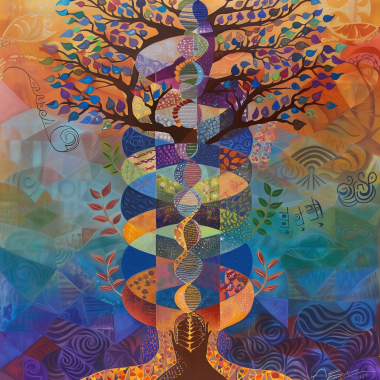על קונסטלציה ותורשה - מאמר באנגלית

https://www.theconstellationsgroup.com/articles/the-inheritance-within.html

"חוקרי אפיגנטיקה חוקרים את הגורמים המשפיעים על ההוראות שהתאים מקבלים להפעלת או השתקת גנים מסוימים. בין הגורמים הללו ניתן למנות עוני או היריון, תזונה, תרופות, הרגלי שינה, לחץ נפשי וכן טראומות רגשיות ופיזיולוגיות עמוקות. אך כיצד ניתן להעביר טראומה שחווינו באופן ביולוגי לדורות הבאים?פרופ’ רחל יהודה, פסיכיאטרית וחוקרת בתחום מדעי המוח בבית הספר לרפואה בהר סיני בניו יורק, הייתה בין הראשונות שניסו למצוא תשובה לשאלה זו. יהודה, בתו של רב, חקרה בתחילה סמנים ביולוגיים של PTSD בקרב יוצאי צבא בניו יורק. מתוך רצון להעמיק את מחקרה, היא פנתה לשכונת ילדותה בקליבלנד, אוהיו, שבה חיו ניצולי שואה רבים. כשהבחינה כי ניצולים רבים באזור הציגו את אותם סמנים ביולוגיים, היא הקימה קליניקה מחקרית וטיפולית ייעודית לניצולי שואה בהר סיני. אך לא רק הניצולים עצמם פנו אליה לטיפול – גם ילדיהם, שסבלו מתסמיני טראומה משלהם, ביקשו עזרה.כאשר יהודה בחנה את הילדים הללו, היא גילתה כי הם היו בעלי סיכוי גבוה פי שלושה לעמוד בקריטריונים של PTSD, בהשוואה לבני קהילתם שהוריהם לא עברו את השואה. עולם הטיפול הפסיכולוגי הכיר זה מכבר בדרכים שבהן לחץ וטראומה הורית מועברים לילדים דרך ההתנהגות ההורית והסביבה הרגשית בבית. אך כאשר יהודה חקרה אימהות שהיו בהיריון במהלך פיגועי ה-11 בספטמבר, היא מצאה כי אם הטראומה שחוו האימהות הובילה ל-PTSD, הרי שגם ילדיהן היו בעלי נטייה מוגברת לפתח תסמינים דומים.ב-2015 פרסמה יהודה מחקר שבחן דגימות ביולוגיות של ניצולות שואה וצאצאיהן, ובו מצאה כי תבנית שחרור הקורטיזול – ההורמון האחראי על תגובת הגוף ללחץ – הייתה דומה אצל שתי הקבוצות. יתרה מכך, היא זיהתה תג אפיגנטי ייחודי, שהוביל אותה למסקנה כי הנטייה לפתח PTSD עשויה להיות מועברת באופן ביולוגי בין דורות. מחקר זה, יחד עם מחקרים נוספים בתחום, מצביע על כך שטראומה אינה מסתיימת עם הדור שחווה אותה – אלא שהיא יכולה להיחקק במערכת הביולוגית ולעבור הלאה לדורות הבאים, תוך שהיא מעצבת את הדרך שבה הגוף והנפש מגיבים ללחצים ולאיומים.
Researchers in the field of epigenetics are now suggesting that our cells may transmit the impact of traumas experienced by relatives and ancestors down through the generations. While it's long been considered a scientific given that our DNA is a stable genetic code, epigenetics researchers study what happens to our genes over the course of our lives. They shine a light on the factors that can influence the instructions cells receive to turn certain genes on and off: factors like poverty or pregnancy, diet, drugs, sleep habits, and stress—as well as big emotional and physiological traumas. But how is it possible to pass a lived trauma down biologically? Rachel Yehuda, professor of psychiatry and neuroscience at Mt. Sinai School of Medicine in New York, is one of the first to try to find an answer.The daughter of a rabbi, Yehuda had been looking into biological markers for PTSD in veterans in New York, and when she became interested in furthering her evidence, she set out for a neighborhood of Holocaust survivors in Cleveland, Ohio, where she'd grown up. After finding enough survivors in this neighborhood who showed the same markers, she created a new investigative and therapeutic clinic back at Mt. Sinai expressly for Holocaust survivors. But it wasn't just the survivors who called her for treatment: their kids, who had their own trauma symptoms, reached out too. She evaluated them and discovered that they were three times as likely to meet the criteria for PTSD than those in their community whose parents hadn't been through the Holocaust. The therapy field has long had its own ideas about how parental stress gets passed down as children live it and feel it in their homes. But when Yehuda did research with mothers who'd been pregnant during 9/11, she found that if the mothers' traumas had resulted in PTSD, then a susceptibility was passed along to their children. In 2015, she published a study noting, in her sample of Holocaust-survivor mothers and their children, a cortisol pattern in both that she'd already associated with PTSD. She also identified an epigenetic tag that lead her to conclude that the propensity for PTSD could be biologically inherited